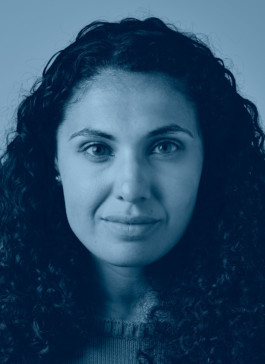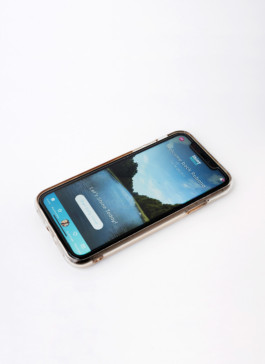Robana: “They’re on the screen, you’re on the screen trying to beat the baddie and Covid is the baddie”


listen:
Photography: Lottie Davies
Audio Producer: Olivia Humphreys
read:
It’s going to sound really silly. So: nursing is very much a touch profession.
We hold people’s hands when they’re upset, or to reassure them. We hug them when they’ve done something great. And even with babies, there’s always that element of touch. But that’s gone.
And I’m quite a touchy feely person – and I think that’s just my nature. But that’s gone. So it almost feels like you’re… you’re almost in a computer game sort of way. There on the screen, you’re on the screen. Trying to beat the baddie almost, and Covid’s the baddie.
My name is Robana Hussein-Mills, and I currently work as a practice nurse in Nottingham City.
So that’s seeing patients face-to-face that come to general practice. I’m also the Deputy Clinical Director of Nottingham City East Primary Care Networks. And I also work for the Clinical Commissioning Group as their Head of Professional Standards and Leadership.
Which means I’ve got a lot on my plate.
Ways of working have changed really quickly – I can honestly say literally overnight. So for example, in my primary care network, we have a lot of homeless people. And those homeless people were put in a hotel. Before when we’re trying to get hold of homeless people, it was really tricky to try and get them to come into any sort of setting to get care. But because they were all in one area, we decided to take those professionals, those experts, out into the hotel.
It worked a lot better, a lot better.
Sex work and illegal drugs went down. The homeless people were more happy to have prescription medication, rather than buying it illegally off the streets. Their mental health improved because they were getting the proper treatment. I mean, it made me reflect deeply actually on how we say these patients are hard to reach – so, homeless, asylum seekers. But actually, us as professionals are the ones that are hard to reach, not them. So actually, taking our services to them gets a better result and actually would save money in the long term.
It was just mind-blowing. All these barriers for many years that the NHS have had – that they can’t do this and they can’t do that – then overnight: it’s all change. We’ve learned that we can work together across organisations. When the chips are down we can really work across organisations. For example, we have a private hospital who said, ‘you know, our outpatients is closed, but our nurses are still here. So if you want to send your patients over to have their bloods taken or their stitches removed, then just please send them over’. I mean, this would never happen. In a normal world, you’d have to go through, jump through 150 million hoops to get that done.
So I’m classed as high risk because I come from BME background, and I’ve also got a long-term health condition. Because I was a high risk, that meant I had to work from home. And recently I’ve been told it will be for the foreseeable future. And when they told me the second time – which is only a month ago – I wasn’t that keen, to be honest, because it is isolating. I can sit on and take telephone calls. I can telephone triage. I can do online video consultations. But, actually, just being there gives me that sense of belonging, almost because you’re a part of that group and working towards a greater good. And it’s really hard to feel that when you’re on your own.
We had an incident at work. We had two people that had stopped breathing: one in the car park and one inside the building. Hearing the feedback from the staff… staff were in tears. It was just absolutely horrific. It was simple things that… you couldn’t take the oxygen cylinder; you couldn’t bring the oxygen cylinder back inside for the other patient because it had been contaminated – potentially – contaminated with Covid.
There was nothing I could do. I could only listen to them. I felt guilty for not being there with my colleagues actually doing the… doing.
So part of my role is supporting nurses across different GP practices, which can be quite tricky at times. And it’s incredibly tricky when you’re working remotely. There were a lot of nurses very, very upset, very tearful at the fact that, you know, they were expecting to go into people’s homes but you didn’t know if that home was Covid-free. Lack of PPE was a huge issue. You can try and reassure people. But when you’re not 100% reassured yourself, it’s really tricky.
If I’ve had a difficult call, I will go for a walk in the garden. Do a couple laps of the garden, come back in. And I’ve got a well-being app as well, that’s of use. For me, it was just a matter of pressing a couple of buttons, and then I could see and I could hear waves. So what I would do is I would stand there, and I would think about being on holiday with the children. You haven’t got a computer screen in front of you. You’re not seeing patients. You’re not seeing staff and, and… the world was a normal place.
I’ve been running on empty for so long. And then I just started feeling unwell mentally and physically, which I couldn’t really understand physically because I wasn’t… it wasn’t like I was rushing around anywhere. But my mind was racing because there were so many meetings, so many people that needed support. I just wanted to go to bed, close the curtains, shut the world away and sleep. But I couldn’t. I couldn’t do that. And using the app helped. And slowly, it sort of got better.
I’m not out of it. I’m not out of it now. Because I know what’s coming. I know we will be hitting a second wave. And I think of all the emotions that went with the first time it happened – all the stress and the anxiety and being overwhelmed and trying to manage everything – to where we’re going now. I plan, and I have to plan for patients and practices. And from a commissioning point of view we’ve planned for the future. We’ve planned for the patients.
But for my own mental well-being it’s better if I just take it a day at a time. And then at the end of the day, I’m grateful. In fact, to be honest, the best time for me is when I’ve got into bed at night, and I know that I’ve… the day’s over.
If I could go back eight months, after everything I’ve been through, I would have turned around and said to myself that ‘You are enough. Robana, you are enough. And please don’t think it just has to be you’. Because I’m very solution-focused, so I have to get a solution and fix something. And it’s what nurses do: we fix somebody’s pain. We hold their hand, we walk through the grief with them. That this is something that we – I – can’t do alone.
Yeah, I think that’s what I would have said.
And ‘Get some sleep. Get some sleep, Robana’.
An Empathy Museum project made with the support of NHS England and NHS Improvement, The Health Foundation, and Arts Council England